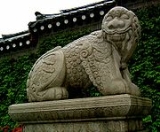
Haetae
Encyclopedia

Korean mythology
Korean mythology consists of national legends and folk-tales which come from all over the Korean Peninsula. Even within the same ethnic group, myths tend to have slightly different variations...
and Chinese
Chinese mythology
Chinese mythology is a collection of cultural history, folktales, and religions that have been passed down in oral or written tradition. These include creation myths and legends and myths concerning the founding of Chinese culture and the Chinese state...
myths. According to Korean and Chinese records, an animal with a horn in the center of its head lived in the frontier areas of Manchuria.
Xiezhi and Haetae sculptures in architecture were widely used in both Korea and China. In old China, emperors always preferred to utilize this sacred animal to symbolise justice. In ancient Korea, Haetae sculptures were used in architecture during the early Joseon dynasty, as their image was trusted to be able to protect Hanyang (now Seoul) from natural disasters and to give law and order among the populace. Seoul city has officially used Haechi (origin of Haetae) as the symbol of Seoul
Seoul
Seoul , officially the Seoul Special City, is the capital and largest metropolis of South Korea. A megacity with a population of over 10 million, it is the largest city proper in the OECD developed world...
since 2009.

